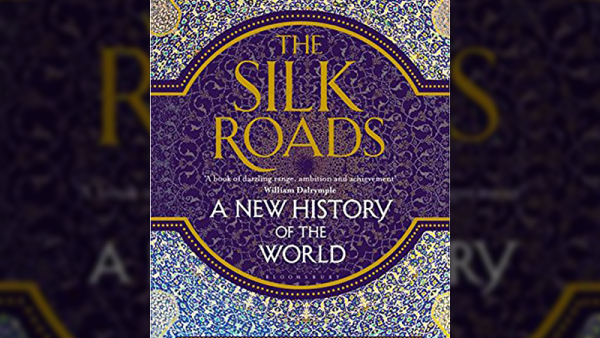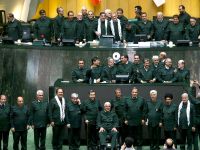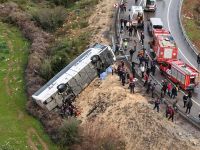Peter Frankopan, Professor of Global History at Oxford University and bestselling author of “The Silk Roads: A New History of the World”, talks to Al Bawaba about globalization, what has made nations in history powerful, and why we must always expect the unexpected.
In The Silk Roads, you argued that the “centre of gravity of the world”, the centre of power, has always been subject to change, but that in fact the western world’s tenure of the position was historically short-lived, and the centres of power have for the most part been located further east. You suggest that the next shift of power will also return to the east. Are we going to see a single centre of gravity, or rather multiple eastern centres of power?
I think it’s very hard to predict the future. All historians will look at the world in a slightly different way but I’m interested in patterns of exchange, both goods and resources, but also of ideas and of how power and authority get competed for. It seems to me that until about five hundred years ago or so, upon the twin European discoveries of passages across the Atlantic to the Americas, and almost at exactly the same time new routes around the Southern tip of Africa to connect to Asia, Europe was a side-show that also ran in the bigger picture of what was going on in the world. I think that as a starting point makes one think about what matters in history. Over the course of the last thirty years we’ve seen a massive redistribution of global GDP to Asia, we’ve seen trends like the rise of the megacity, we see big competition for power in the East, or rather what Europeans call the East. I mean that region between Turkey and China, where at the moment we can see any number of quasi-imperial powers, reaching out both within their own countries to articulate a particular vision for the future, but also beyond their borders in many cases. They feel their time is coming to shape the world and what it looks like. And that looks to me dramatically different from the kinds of conversations that we are having in Europe and the United States today.
************
How do you envisage the new Silk Roads, the One Belt One Road project currently being bankrolled by China, affecting the new landscape of geopolitics?
The project is a multi-headed animal and there are lots of different elements that have gone into putting it together, and numerous views and voices inside China about what it may or may not achieve. I think we’re still at the very early stages. It was only three or four years ago that the project got up and running. There are a lot of commentators who are a lot more sceptical about what it may achieve and what its outcomes will be. But there are many who are hugely invigorated by the impact of what massive scale infrastructure spending can do. I wouldn’t say the jury is necessarily out, but the single most important thing is that this has Beijing’s full attention and resources being poured into it. I think you learn from history that things that have a plan tend to play out in a certain way. There are the haphazard, unintended consequences where things get fragile, but if there’s a degree of control over what the master plan is, the outcomes will be much more controllable.
************
Technology has perhaps not broken down national borders, but it is certainly making them easier to get across for all sorts of agents. How is this going to affect the re-concentration of global power in new centres?
We always think that we’re living in the most challenging age of technology, but I can show you accounts written two thousand years ago which talk in the same way about how new technology is proving disruptive and changing the way we live. People always use technology to get advantages over each other, and typically it’s used to redistribute economic forces, because if you can use your technology to your advantage then that is usually to someone else’s disadvantage. I don’t think it’s too hard to understand what happens with these technologies, rather it’s a question of who controls them and how they’re used.
************
One thing that becomes clear in The Silk Road is that power is not only about economic and military might, since cultural influences and exchanges of ideas and goods also have powerful ramifications for a nation’s standing. This is similar to what the political scientist Joseph Nye means when he talks about hard and soft power. Military and economic might are critical, but the global popularity of its philosophical and cultural exports can and do make critical differences to a nation’s place in the world. Economic and hard power may be re-concentrating in the east, but it is generally thought that the west is winning the contest to shape cultural globalization.
I think it’s interesting that we frame it with the idea that it’s a contest. I think there’s a pre-disposition to think in terms of contests, but I don’t think that one can argue that Taylor Swift or Ed Sheeran are winning a contest, it depends on what exactly that means. I don’t recognize the framework of seeing hard power or soft power as part of a binary of winning and losing. I think that it’s true that power is not just about trade and money, it’s not just about the soft side of films, or music or people feeling happy wearing jeans. It’s also about the narratology and that’s why historians have to provide the context to explain what’s going on. There’s a lot of other factors one can bring into this discussion, and one of the challenges of history and political science is that those parameters are normally so narrow, and tend to look at aircraft carriers and missiles, or new technologies. To be useful the key is to try and take a 360-degree approach. We are living in an era of profound change and it depends how one tries to assess that, but I’d be surprised if the name of Justin Timberlake ends up in histories written in three or four hundred years about the early 21st Century.

************
What will the rise of the east mean for the codes of political liberalism such as democratic accountability and human rights?
I’m sitting in Oxford, where we’re celebrating a hundred years of women receiving the vote. That came two thousand years later than it should have, but it shows that things depend on the velocity of change. In Europe and in developed economies there’s been a big kickback that’s now part of the mainstream political debate, in Europe, with Hungary and the rise of the right, and also the rise of the left, as well as in America. I think it’s fair to say that all through the Silk Roads, from China to Turkey and the Gulf states and so on, there are very uncomfortable relationships with things like faith, openness, tolerance and things like faith, free speech, sexuality, gender and so on. Yet I can show you different countries in the east, and different provinces within different countries, in which the correlation is different. Each area is on its own trajectory so it’s very hard to generalise about these things. By and large it might be slightly pushing it to say that prosperity breeds tolerance, but it’s very hard to have tolerance if you don’t have prosperity. And I think that move and that growth in Asia does tell its own story of what kind of capacity governments and states already have and will have.
************
That discomfort in questions of identity in the west today is tied into the idea of globalisation. You have previously said that globalisation has acquired a negative connotation that it doesn’t deserve, since it’s not a new phenomenon in that flows of culture, people and trade has existed for centuries. That said, we do see a self-consciousness about hyper-connectivity in this century, and a pushback against the idea of globalisation as a result. How do you see that as having come about?
Because cynical politicians use it as a natural skeleton on which to hang their mark of difference. Instead of asking if it’s a good thing that we can buy goods cheaper from elsewhere in the world, something which certainly suits the consumer but doesn’t necessarily suit the citizen and taxpayer. I suppose it’s inevitable that there will be calls to protect uniformity, and calls to protect local industry which is understandable, and off the back of that come questions about what it is to be British or Turkish or Saudi, and then the next stop is Make America Great Again. Every single country in the world is experiencing this now, and that drives nationalism. To an extent that’s built upon a fallacy of the idea that either you can turn back time to a moment in history where your country was dominant, but also the belief that this would benefit everyone, even if it was possible. But it’s not only in the 20th Century that we’ve seen the rise of politicians who peddle a story that falls on fertile ground. At any time period you can find rulers who were able to unite people by explaining that the suffering they have can be corrected. It seems to me that that’s very close to where we are at the moment.

Funnily enough, one of the weak spots that we have in developed economies is that there is a particular challenge for democratic systems. In the UK we have elections every five years, and in the US every four years, and that means there is constantly an incentive to be promising jam tomorrow rather than jam in a few years’ time. That’s the striking difference with China’s current economic plan, which runs until 2049. So when you’re making decisions over that long a time frame, there are obviously challenges in doing that, but you aren’t in the situation of having to reward your voters on a very regular basis. And when you always have to play to the domestic concerns of today, you don’t align what might be right for the next generation. For whatever reason, politicians haven’t worked out that they need to be saying a lot more about what the long term future is and what our plans are. But in looking at the last two thousand years of warfare and conflict, it would be naïve to think that would never happen to us again. That just fundamentally misunderstands the past.
************
To zoom in on the Middle East a little bit, as you say certain powers do have a greater advantage in that they are able to make longer rather than short term promises to their voters because of their existing political makeup, and this affects their future power projections. Where and how do you think power is going to rise within the Middle East?
That’s the million-dollar question. You see the Syria peace talks being conducted by Presidents Rouhani, Erdogan and Putin, which I think tells its own story of who has most at stake. Obviously the effect of the conflict is felt across the region but I think those three big powers have much stronger, clearer stakes in the game than anyone else. What decisions get made behind closed doors between those three is tricky to say, but it’s interesting that there’s no space for the President of Iraq, there’s no Israeli contribution, there’s no Jordanian and Lebanese presence, and so on. Saudi Arabia is obviously going through its own big reconfiguration. Iran doesn’t just look westwards towards Iraq, Syria and so on. It also has to keep a close eye on Afghanistan and Pakistan to, as well as Russia. As a historian, I have to point out that crossroads and central points on the global jigsaw always have influences, and there’s a real danger in looking at a single moving part. But it’s a mug’s game trying to guess what will happen, because these ultra-fragilities can explode from nowhere. I think that ten years ago no one would have bet that Syria would become the state it is today, of all the states in the Middle East. We have the degradation of Libya into an essentially failed state, and a transition in Egypt from a stable, relatively well-governed state with protections for its minorities into one that’s haemorrhaging money and with huge pressures for the Christian population in Egypt. I think we forget that the trigger for all of this, starting in Tunisia, can come out of nowhere. All I can offer as a historian is a framework to try and understand what has happened up until this point, and, within a certain set of parameters, how to plan for the future.
- 'You Can't Separate Trump's Mental Health From His Voters': Q&A With Mental Health Expert Dr. Bandy Lee
- ‘The Stability of the Middle East is at Stake’: Q&A with UNRWA’s Spokesperson on Trump’s Funding Cuts







